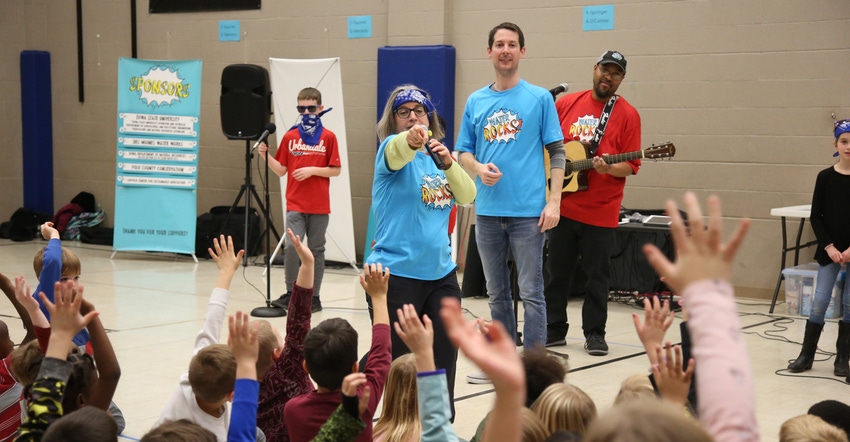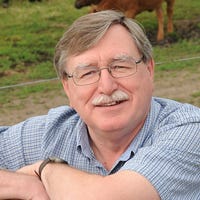December 20, 2019

As director of the Leopold Center for Sustainable Agriculture housed at Iowa State University, Mark Rasmussen often finds himself reassuring people that center is alive and kicking.
The center's mission includes an educational component to inform the ag community and the general public about its 30-plus years of research findings. It also has a national reputation for supporting cutting-edge research leading to major dividends for Iowa—cleaner water, better conservation of natural resources, and greater agricultural vitality. The Leopold Center is named for Aldo Leopold (1887-1948), a native of Burlington, Iowa, known internationally as a conservationist, ecologist and educator.
“After a cutback in state funding a few years ago, the Leopold Center did reduce staff and currently has only a fraction of the research funding previously available. But due to a healthy endowment, it is still providing research and outreach support for sustainability-focused programs,” Rasmussen says. “We are challenged to find creative methods to maximize the impact our support has on the state, but the program is doing well and will continue for the foreseeable future.”
Partner with Iowa Learning Farms
The Leopold Center has been an active sponsor and partner to Iowa Learning Farms and Water Rocks! since their beginnings. Early grants helped to develop educational materials, contributed to the Conservation Station trailers and supported the expansion of professional staff for the programs. Over the past decade Leopold Center funding for ILF and Water Rocks has topped $415,000.
 CENTER’S FUTURE: “We are in it for the long haul,” says Director Mark Rasmussen.
CENTER’S FUTURE: “We are in it for the long haul,” says Director Mark Rasmussen.

“While we can no longer provide the same level of monetary support, our relationship with ILF and Water Rocks has continued to flourish, as our goals for providing water quality and conservation outreach and education to all Iowa constituencies are closely aligned,” Rasmussen says. “We’ve built a symbiotic relationship between the organizations where Leopold Center provides financial support and the ILF and Water Rocks teams take the key messages to the streets, engaging with the audience we are all trying to reach.”
Asked why the Leopold Center continues to fund these programs, Rasmussen says, “I can sum it up in two words: unbridled enthusiasm. They are all go-getters, and have created and sustained highly successful Extension programming. In addition, the impact Water Rocks has made on Iowa’s youth is evidenced by the extraordinary demand for its assembly and classroom visit programs.”
Environmental education
Referring to the center’s namesake, Rasmussen points out that Leopold talked about people needing to develop a land ethic and exercise responsibility for the environment they all share. “Getting young people to set aside screens and technology for a brief period to spend time thinking about the natural world is a tremendous step forward,” he says. “Water Rocks gives our schoolchildren the information and impetus to do exactly that.”
Rasmussen represents the Leopold Center in ILF and Water Rocks planning and strategy sessions. He says he’s learned from their methods, particularly in using visual communications techniques to connect with audiences. “As a scientist, I can be a little bit dry in presenting information, but have learned to use more graphic content to create impactful reports and documentation, thanks to the advice and assistance of the ILF team,” he says.
Furthering its mission to advocate and support sustainable agriculture and conservation, the center continues to sponsor research, education and outreach in other ways.
The Leopold Center Sustainability Scholarship Program was launched during the 2019 fall semester. The program offered Iowa college juniors and seniors grants up to $1,000 for creative and innovative sustainability proposals. The award also included matching the recipient with a mentor to facilitate success. Rasmussen plans to offer the program during the spring 2020 semester.
Research on climate change
The Leopold Center Research Program is another area where Rasmussen is hoping to make an impact. Drawing on his diverse background and experiences in microbiology, agriculture and conservation, he is working on climate change research in the area of inorganic carbon storage in the soil.
While still in its formative stages, the goal of the research is to better understand how carbon may be removed from the atmosphere by microbial activity in soils. If proven to be successful, the result could be one method that could contribute to reducing the climate impacts of the ever-increasing amount of carbon dioxide in the atmosphere.
Rasmussen says the future is bright for the Leopold Center and its mission to support sustainability research and programs. “We are in it for the long haul. There may come a time in the future where state funding is available, but until that time, we are out there pushing the edges of innovation and research that will benefit our communities, state, nation and world.”
Staudt is program manager for Iowa Learning Farms and director of Water Rocks.
Source: ILF, which is solely responsible for the information provided and is wholly owned by the source. Informa Business Media and all its subsidiaries are not responsible for any of the content contained in this information asset.
You May Also Like




